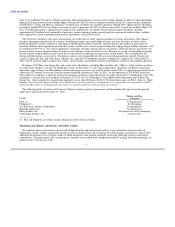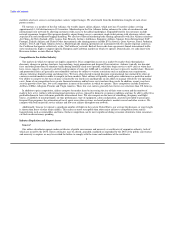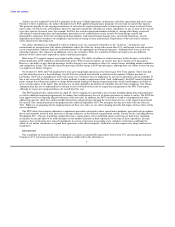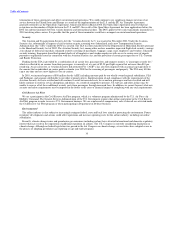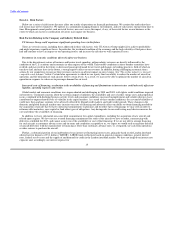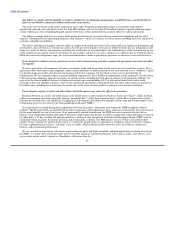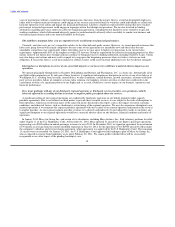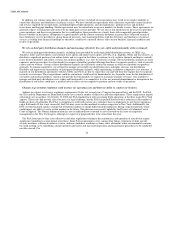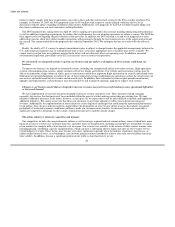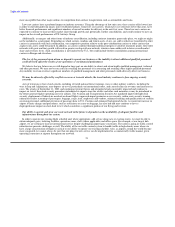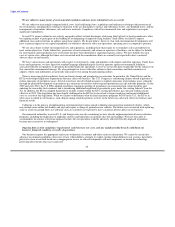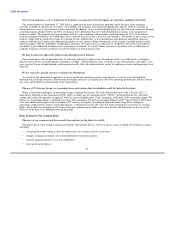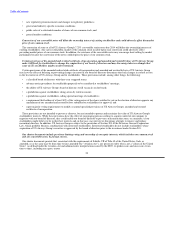US Airways 2010 Annual Report Download - page 18
Download and view the complete annual report
Please find page 18 of the 2010 US Airways annual report below. You can navigate through the pages in the report by either clicking on the pages listed below, or by using the keyword search tool below to find specific information within the annual report.
Table of Contents
Any failure to comply with the liquidity covenants contained in our financing arrangements would likely have a material adverse
effect on our business, financial condition and results of operations.
The terms of our Citicorp credit facility and certain of our other financing arrangements require us to maintain consolidated
unrestricted cash and cash equivalents of not less than $850 million, with not less than $750 million (subject to partial reductions upon
certain reductions in the outstanding principal amount of the loan) of that amount held in accounts subject to control agreements.
Our ability to comply with these covenants while paying the fixed costs associated with our contractual obligations and our other
expenses will depend on our operating performance and cash flow, which are seasonal, as well as factors including fuel costs and general
economic and political conditions.
The factors affecting our liquidity (and our ability to comply with related covenants) will remain subject to significant fluctuations and
uncertainties, many of which are outside our control. Any breach of our liquidity covenants or failure to timely pay our obligations could
result in a variety of adverse consequences, including the acceleration of our indebtedness, the withholding of credit card proceeds by our
credit card processors and the exercise of remedies by our creditors and lessors. In such a situation, it is unlikely that we would be able to
fulfill our contractual obligations, repay the accelerated indebtedness, make required lease payments or otherwise cover our fixed costs.
If our financial condition worsens, provisions in our credit card processing and other commercial agreements may adversely affect
our liquidity.
We have agreements with companies that process customer credit card transactions for the sale of air travel and other services. These
agreements allow these processing companies, under certain conditions, to hold an amount of our cash (referred to as a "holdback") equal
to a portion of advance ticket sales that have been processed by that company, but for which we have not yet provided the air
transportation. We are currently subject to certain holdback requirements. These holdback requirements can be modified at the discretion
of the processing companies upon the occurrence of specific events, including material adverse changes in our financial condition. An
increase in the current holdback balances to higher percentages up to and including 100% of relevant advanced ticket sales could
materially reduce our liquidity. Likewise, other of our commercial agreements contain provisions that allow other entities to impose less
favorable terms, including the acceleration of amounts due, in the event of material adverse changes in our financial condition.
Union disputes, employee strikes and other labor-related disruptions may adversely affect our operations.
Relations between air carriers and labor unions in the United States are governed by the Railway Labor Act ("RLA"). Under the RLA,
collective bargaining agreements generally contain "amendable dates" rather than expiration dates, and the RLA requires that a carrier
maintain the existing terms and conditions of employment following the amendable date through a multi-stage and usually lengthy series
of bargaining processes overseen by the National Mediation Board ("NMB").
If no agreement is reached during direct negotiations between the parties, either party may request the NMB to appoint a federal
mediator. The RLA prescribes no timetable for the direct negotiation and mediation processes, and it is not unusual for those processes to
last for many months or even several years. If no agreement is reached in mediation, the NMB in its discretion may declare that an
impasse exists and proffer binding arbitration to the parties. Either party may decline to submit to arbitration, and if arbitration is rejected
by either party, a 30-day "cooling off" period commences. During or after that period, a Presidential Emergency Board ("PEB") may be
established, which examines the parties' positions and recommends a solution. The PEB process lasts for 30 days and is followed by
another 30-day "cooling off" period. At the end of a "cooling off" period, unless an agreement is reached or action is taken by Congress,
the labor organization may exercise "self-help," such as a strike, which could materially adversely affect our ability to conduct our
business and our financial performance.
We are currently in negotiations with unions representing our pilots and flight attendants, and both negotiations are being overseen by
the NMB. As a result, these unions presently may not lawfully engage in concerted refusals to work, such as strikes, slow-downs, sick-
outs or other similar activity, against us. Nonetheless, after more than five
17


